English : Term 1 Unit 2 : My Native Place
UNIT 2
My Native Place
Hi, I am Nila.
I love my native place.
Do you?
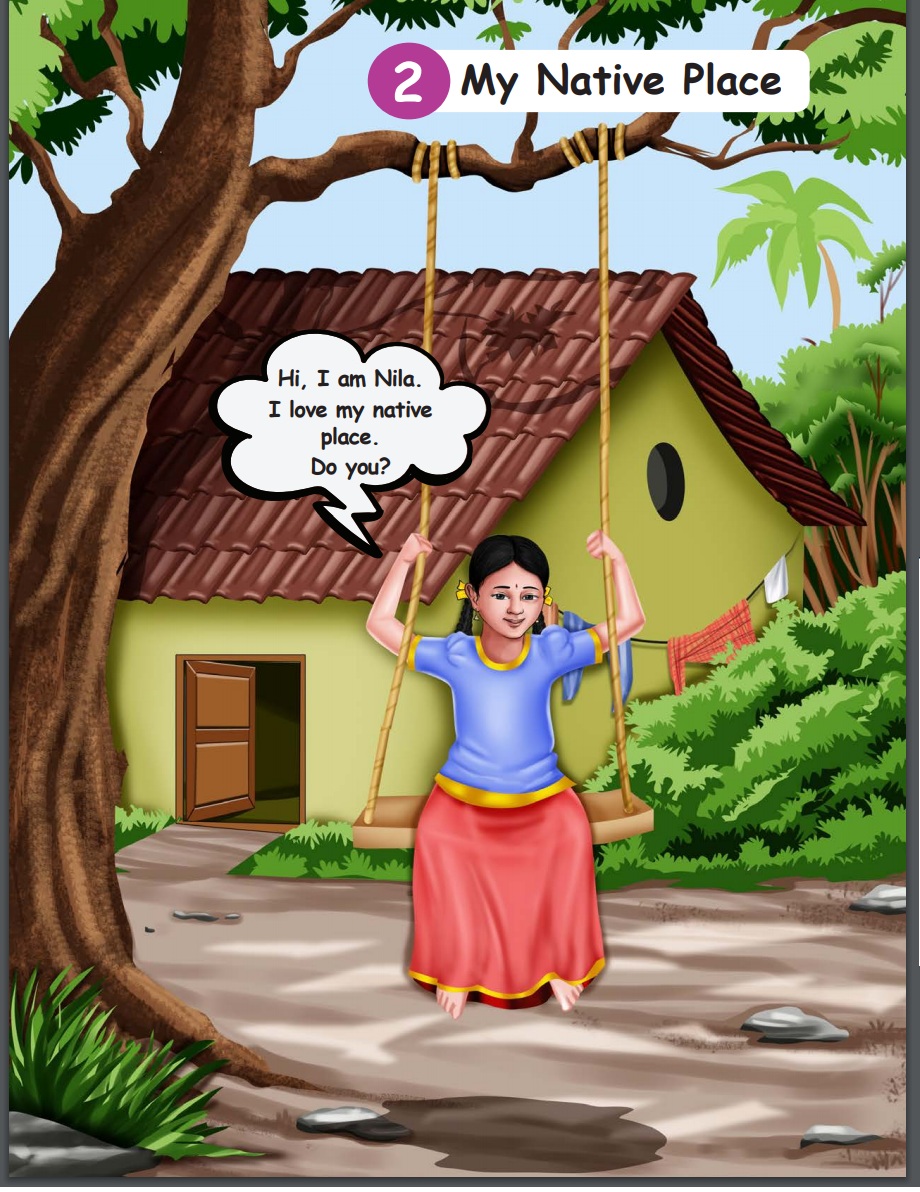
MY LITTLE PICTIONARY
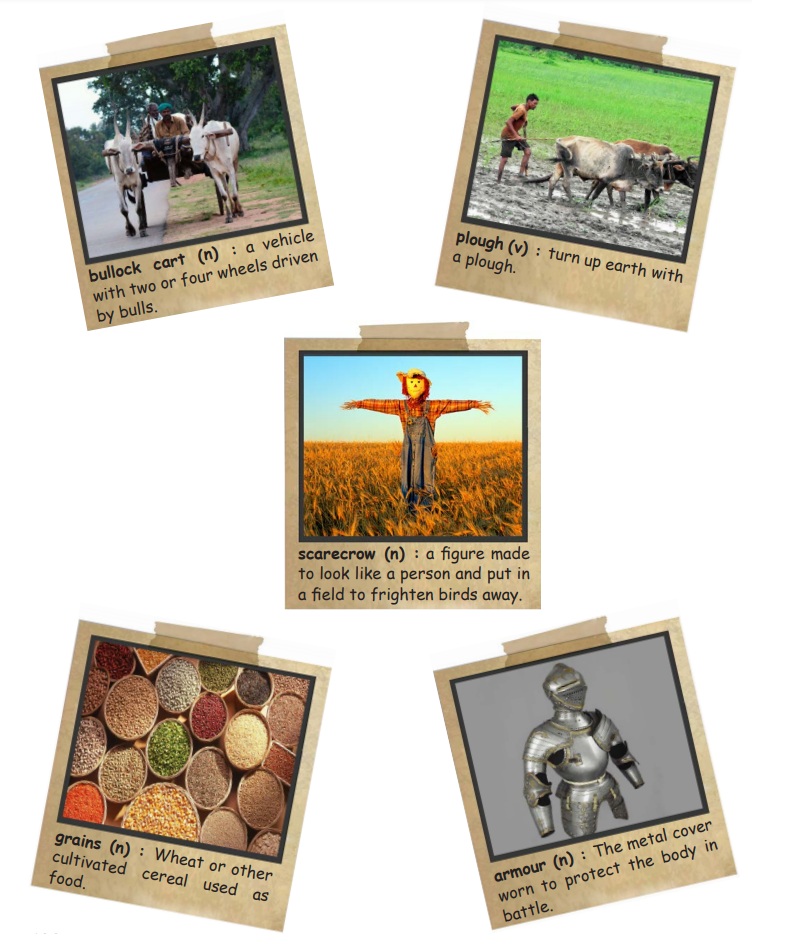
LET US LEARN
Trip to My Grand Parents Village
It is summer. Santhosh’ vacation has started. His parents are going to Sirumalai, his parents’ village. Santhosh is excited. He records an audio diary on his mother’s phone. He records all his feelings during the visit. Later, he writes down in his diary what he had recorded. Let’s read his diary to know his experiences during this visit.
10th April:
I am very eager to visit my grand parents’ village. I will meet my grand parents and cousins. I have packed my clothes and tab for playing video games. We will be travelling in a bus. I am so excited.
11th April:
Today we are travelling. Though it is summer, the weather is pleasant in the morning. There are numerous trees with yellow flowers on both sides of the road. There is greenery all around. There are many white cranes in the lush green paddy fields. The scarecrows have managed to scare away the crows in the fields. There is no traffic, noise and air pollution in the village.
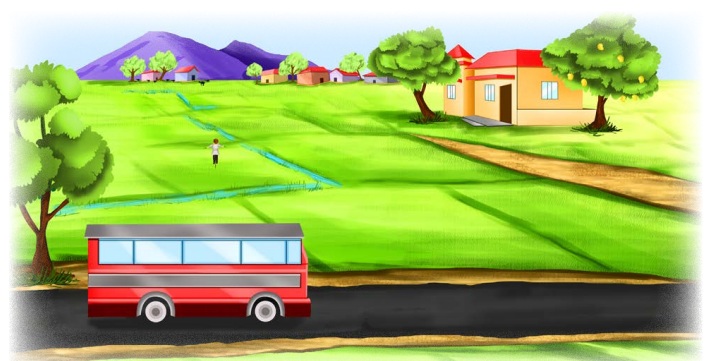
I get off the bus and run to meet my grandparents. They are delighted to see me. The house is surrounded by many big trees. There are a few jackfruit, mango, neem, banana, pomegranate and coconut trees. The trees have abundant fruits. My grandfather has plucked some ripe mangoes for me. The mangoes are so juicy and sweet.
12th April:
I have woken up early today. I am out for a walk in the morning. The cool breeze is pleasing. The coconut palms are swaying lazily. The farmers are already in their fields. Some of them are cutting the crops and some of them are threshing the paddy. The air is filled with the sweet sound of birds singing in the trees and the bushes. The cuckoo’s song is perhaps the most enchanting.
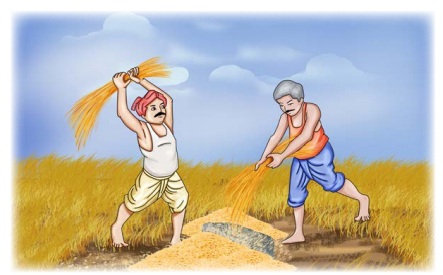
When I come home, I freshen up and eat the tastiest breakfast in my life. Later, my grandmother introduces a girl, Paavai. She goes to the village school. She lives down the street. She is very eager to show me around the village. Paavai shows me how to play with a tyre and a stick. We happily run down the lanes balancing the tyre with a small stick. We stop to talk to Paavai’s friends, Amir, Peter and Umaiyal. All children here too have their summer vacation. Amir is helping his father in milking their cows. He lets me pat his black calf. Peter and Umaiyal are sitting with their grandmother breaking groundnut pods and piling them neatly. Later they will take the nuts to the village market to sell them. I help them for some time.
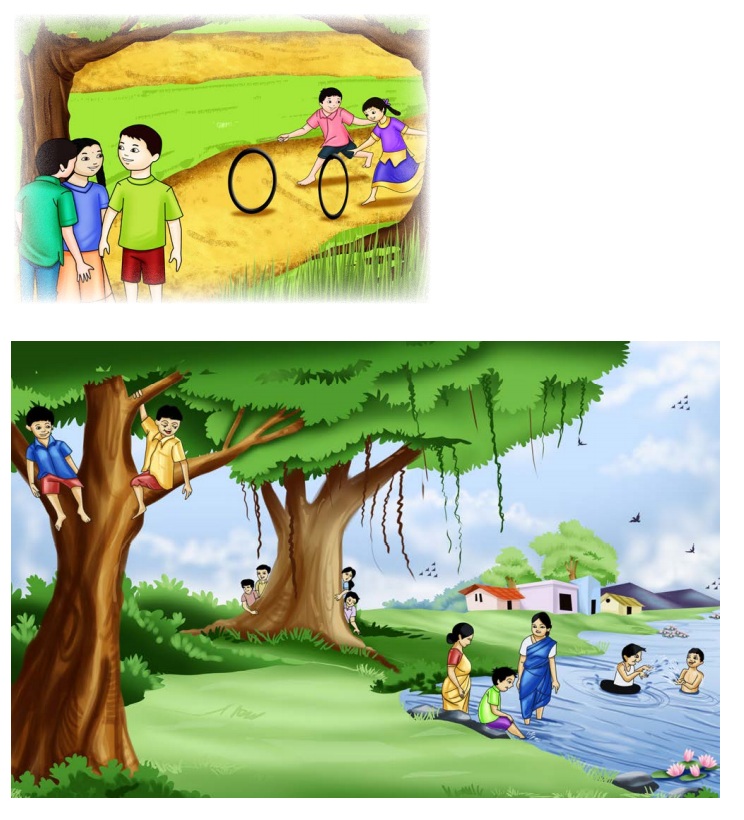
13th April:
Paavai takes me to the village pond. There are many children splashing around in the pond. Some boys are climbing to the top of the tall tamarind tree. Girls are playing hide and seek near the big banyan tree.
My mother and my aunties take me to the river for a refreshing bath. I play for some time in the cool water but I cannot swim. So, I sit on a big smooth rock and watch my friends swim like experts. They talk and laugh a lot as they wash their clothes and dry their hair in the Sun. The river is so clean that I can see the pebbles in the riverbed and colourful fish swim by. I love the scenery.
14th April:
We are back to our home in the city. The trip to our grand parents’ home was so enjoyable. Those two days flew by so fast. I realised that during this stay, I had neither watched television nor played video games. I am eagerly looking forward to our next visit.
Think: Is TV and video game the only way to pass time? Can we do something else?
Glossary
Eager : keen
vacation : holiday
numerous : great in number
pebble : a kind of stone
expert : well skilled
LET US UNDERSTAND
A. Match the following.
cuckoo : blows
breeze : sings
river : swims
fish : flows
Answer:
cuckoo : sings
breeze : blows
river : flows
fish : swims
B. Answer the following questions.
1. How did Santhosh record his diary?
At first, Santhosh recorded his feelings as an audio diary on his mother’s phone.
2. Name some of the activities that the village children were doing on their vacation.
Amir was helping his father in milking their cows. Peter and Umaiyal were breaking groundnut pods.
3. Why did Santhosh forget to watch television or play video games?
As the trip was very enjoyable out in the village, Santhosh forgot to watch television or play video games.
4. Did Santhosh enjoy his morning walk? How do you know?
Yes, Santhosh enjoyed his morning walk. Santhosh felt that the breeze was pleasing and the song of the cuckoo was enchanting.
5. How did Santhosh spend his time when he went to the river?
Santhosh played for sometime in the cool water. Then he sat on a smooth rock and watched his friends swimming like experts.
6. How does Santhosh know that the river is clean?
Santhosh could see the pebbles in the riverbed and the colourful fish swimming by. These sights show Santhosh that the river is clean.
LET US BUILD
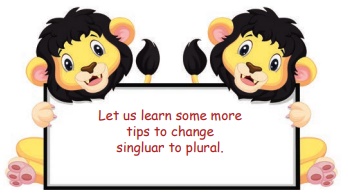
You already know singular and plural.
Try this.
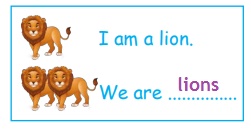
1. Change -f and –fe, into -ves.
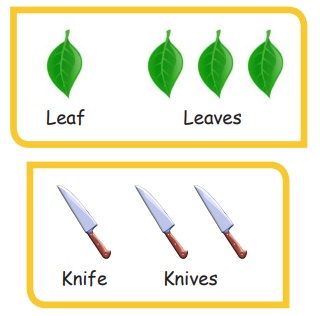
2. By changing their vowels, such as oo to ee or an to en.
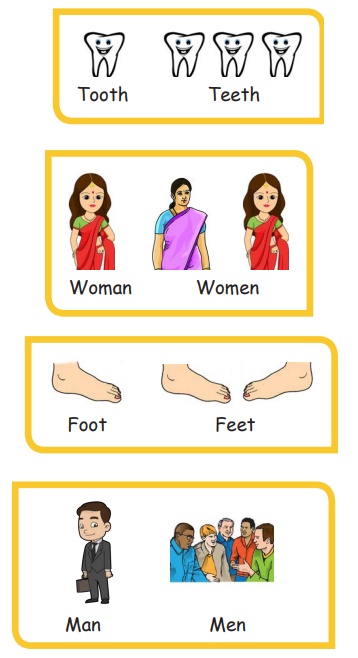
3. Irregular plurals

4. Some nouns are identical in both the singular and the plural forms. Many of these are names of animals.
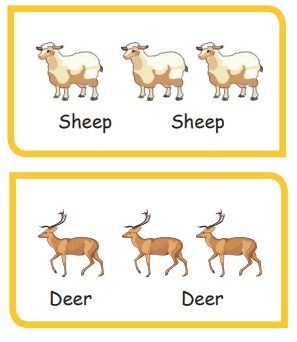
5. Add es for some words ending with o.
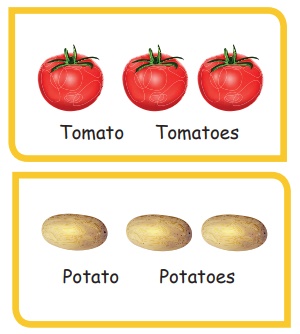
A. Look at the picture and tick (✔) the correct plural word.
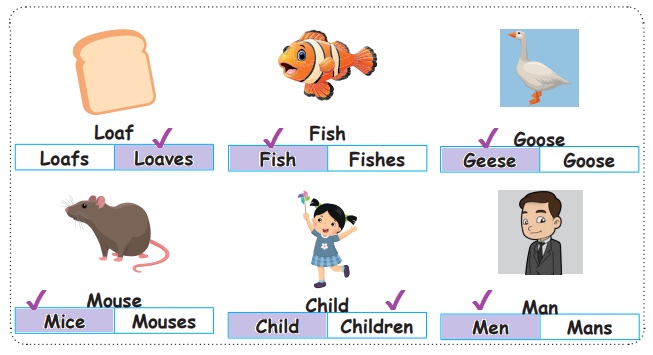
B. Write the plural form.
1. leaf  – leaves
– leaves
2. mango  – mangoes
– mangoes
Note to the teacher: Teach exceptions for the words ending with ‘o‛ like photo – photos, radio – radios, zero – zeros.
LET US SING
Farmer’s Friend
Often seen as filth
But gives the soil good health
To reward the farmer with wealth.
Ploughs the soil before farmer
Use not the chemicals to harm her
Please praise our mother land’s armour.
Shy to show his looks
Toils often on fishing hooks
To give the fisher something to cook.
Be humble like a worm
Think no one to harm
You will be free to spread your charm.
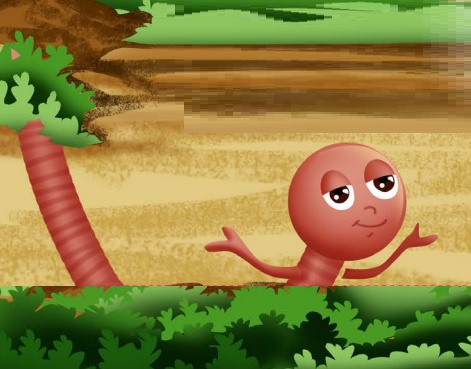
Note to the teacher: Sing the song with actions. Encourage children to listen and sing along with actions.
Glossary
Filth : dirt,ugly
ploughs : tills
humble : not proud
toils : work extremely hard
harm : making physical injury
A. Match the rhyming words.
filth – farmer
cook – harm
charm – wealth
armour – look
Answer:
filth – wealth
cook – look
charm – harm
armour – farmer
B. Fill in the blanks.
1. It ploughs soil before the farmer.
2. It is used in the fisher’s fishing hook.
3. We don’t use chemicals in the soil.
4. Be humble like a worm.
C. Answer the questions.
1. How do we see the earthworm often?
Often we see the earthworm as a dirty living thing.
2. What does it give to the farmer?
It gives wealth to the farmer.
3. Why don’t we use chemicals?
The chemicals will kill the earthworm. So we don’t use chemicals.
4. How do we work?
We work hard but we remain humble.
LET US KNOW
Continuous tense is a category of verb tenses. Here we will see the past continuous tense. You all know forms of verbs. Those are

The present participle form is used in past continuous tense with auxiliaries was and were. Come let us use it.

In the above examples you can see, the main action is in present participle form for all the subjects and the auxiliary alone changes.
‘was’ is used for I, he, she and it
‘were’ is used for you, we and they.
Give the correct verb form for following sentences.
 I was reading the poem.
I was reading the poem.
 They Were writing (write) the poem.
They Were writing (write) the poem.
 It was going (go) to Delhi.
It was going (go) to Delhi.
 She was drawing (draw) a picture.
She was drawing (draw) a picture.
 We were eating (eat) fruits.
We were eating (eat) fruits.
 He was watching (watch) movie.
He was watching (watch) movie.
 You were making (make) lunch.
You were making (make) lunch.
Let us see when to use the past continuous tense.
At some point in the past
I was writing my homework at 5 PM yesterday.
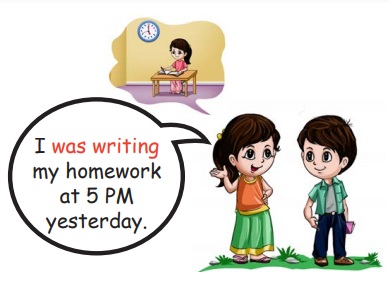
Parallel Actions
What was your brother doing then?
When I was writing my homework, he was watching TV.
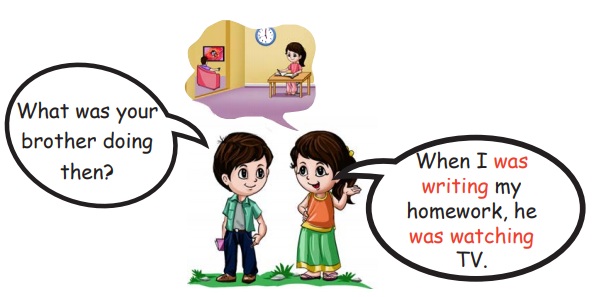
Interrupted action in the past
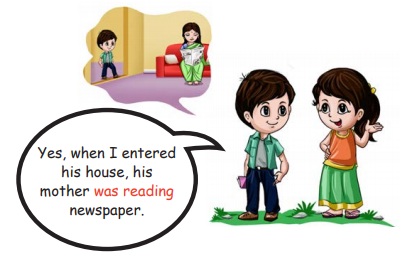
Write what they were doing at 5 ‘o’ clock yesterday.
I was playing cricket with my friends.
My mother was watching the TV.
We were eating mango.
My friends were riding their bicycles.
Mohan was writing a letter.
The bell was ringing loudly.
See and write what they were doing.
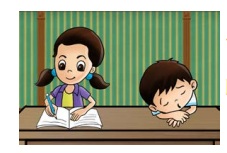 While I was writing, he was sleeping.
While I was writing, he was sleeping.
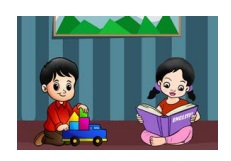 While the boy was playing, the girl was reading.
While the boy was playing, the girl was reading.
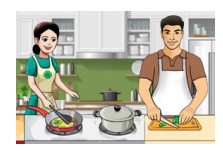 While my mother was cooking, my father was cutting vegetables.
While my mother was cooking, my father was cutting vegetables.
Now, we are going to see the future continuous tense. You all know forms of verbs. Those are

The same present participle form is used in future continuous tense with auxiliary will be. Come let us use it.

In the above examples you can see, the main action is in present participle form and the auxiliary is ‘will be’ for all the subjects.
Give the correct verb form for following sentences.
 I will be waiting for you.
I will be waiting for you.
 They will be coming (come).
They will be coming (come).
 It will be playing (play).
It will be playing (play).
 She will be swimming (swim).
She will be swimming (swim).
 We will be drinking (drink).
We will be drinking (drink).
 He will be doing (do).
He will be doing (do).
 You will be taking (take) leave.
You will be taking (take) leave.
How to use the future continuous tense
I will be travelling in a bus by this time tomorrow
My friends will be playing but I am working here.
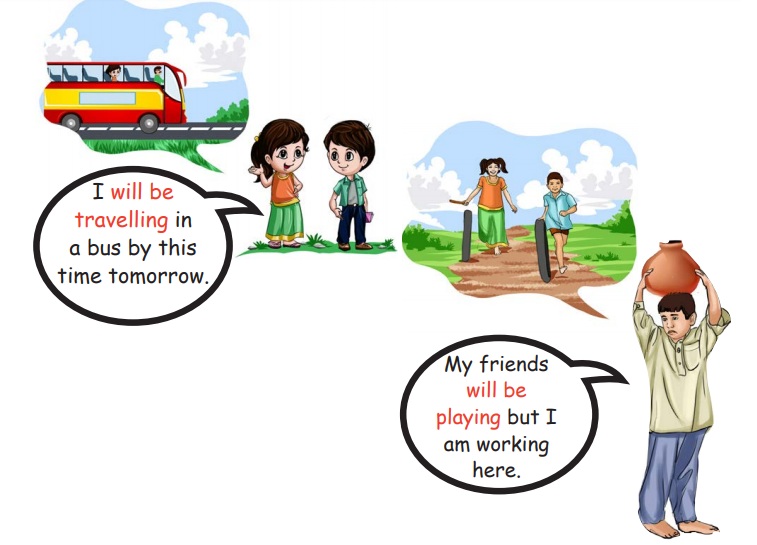
Uma’s family is going on a holiday. Write what they will be doing there.
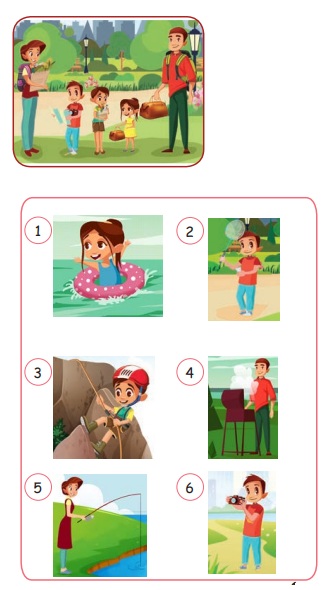
1. Uma will be playing water games.
2. Her brother will be visiting the exhibition.
3. Her sister will be playing video games.
4. Her father will be playing keyboard.
5. Her mother will be fishing.
6. Her brother will be taking photographs.
Change the sentences from past continuous to future continuous.
She was waiting for bus.
She will be waiting for the bus.
They were going to Coimbatore.
They will be going to Coimbatore.
Suresh was playing chess.
Suresh will be playing chess.
Rafiq was eating breakfast.
Rafiq will be eating breakfast.
Prasanth was reading newspaper.
Prasanth will be reading the newspaper.
Change the sentences from future continuous to past continuous.
I will be spaeking to her.
I was speaking to her.
Lucy will be getting ready.
Lucy was getting ready.
The train will be arriving on 2nd platform
The train was arriving on 2nd platform.
We will be sleeping in terrace.
We were sleeping in the terrace.
It will be raining heavily.
It was raining heavily
LET US LISTEN
Circle/underline yes or no to the following.
Kothai: Hai Akshaya, how are you?
Akshaya: Hello Kothai I am fine and what about you?
Kothai : I am also fine, okay meet me brother Varun.
Akshaya: Nice to meet you, Varun.
Varun: Nice to meet you too.
Akshaya: What are you studying, Varun?
Varun: I am studying 2nd standard.
Kothai: He is here to play kho-kho with us.
Akshaya: oh! He is always welcome. I take him in my team.
1. Three persons are involved in the dialogue Yes No
2. Varun is studying 4th standard Yes No
3. Akshaya is Varun’s sister Yes No
4. They play Kho-Kho Yes No
5. Varun plays in Kothai team Yes No
Note to the teacher:
Scan the QR code to listen to the audio. Let the children listen to the audio and answer the question. The listening passage is given at the end.
LET US SPEAK
See how they speak at this situation and practise as if you were in that situation.
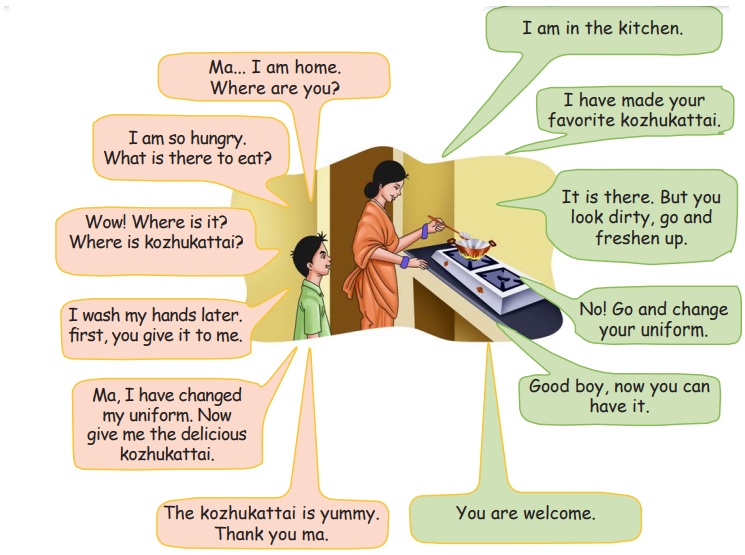
Structures that are useful for this situation.
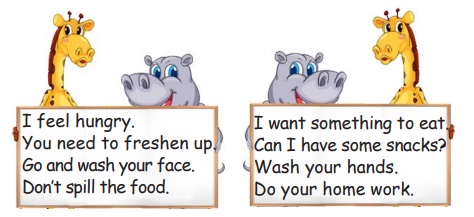
Note to the teacher: Make the children practise these phrases and give them different scenarios to practise.
LET US READ
The Farmer and his Daughters

In the village of Manipuram, there lived a wealthy farmer. He had three daughters. All his daughters were married and living their life happily. The farmer was getting old. He wanted to distribute his wealth to his daughters. But he wanted to know what responsibility he could give to each of his daughters. He called all his daughters and gave each of them a bag of millet. He asked them to use grains in the best way possible and then come back to him after one year.
After one year the daughters came back to their father’s house. The farmer welcomed all of them.
First he called the elder daughter and asked about what she had done with the grains given to her. She replied,”Father, I fed those grains to flocks of birds that I saw on my way back to home.”
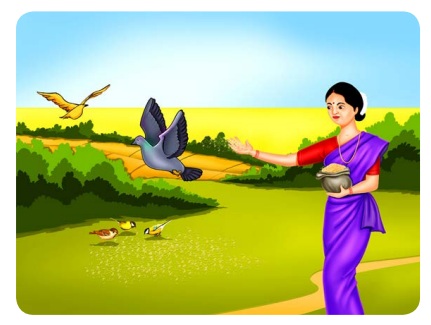
Then the father called the second daughter and asked the same. She replied,”Father, I thought those grains were sacred. So I mixed those with other grains kept for community food service. So that everyone could have it. After this, the third daughter came. The farmer asked her about the grains.She said, “Father, I don’t have those grains with me now. I need two bullocks and men to get the grains.” Father was confused and asked her, “Why do you need bullocks and men to bring the grains here?”
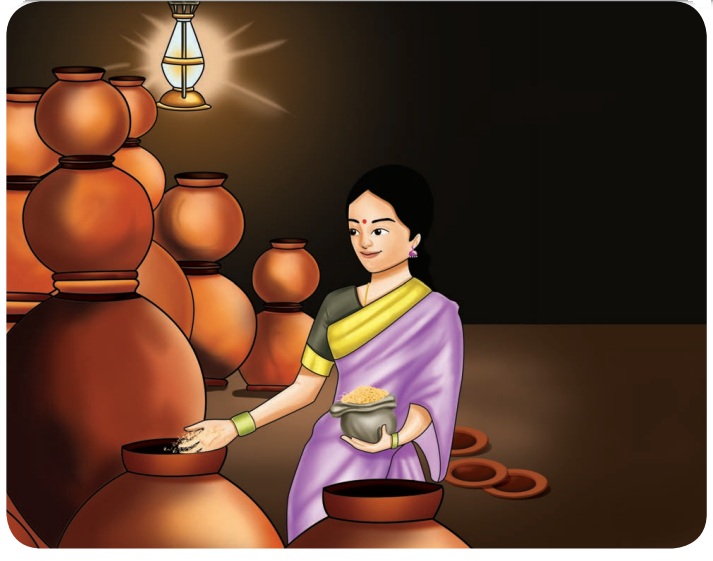
The daughter smiled and replied “I sowed those grains and now it has grown as crops. So, I need a bullock cart and men to harvest and bring back the grains.” Father was happy to know that she used the grains wisely. Father found her apt and gave her the responsibility of the fields. He distributed his other wealth equally among the other two daughters.
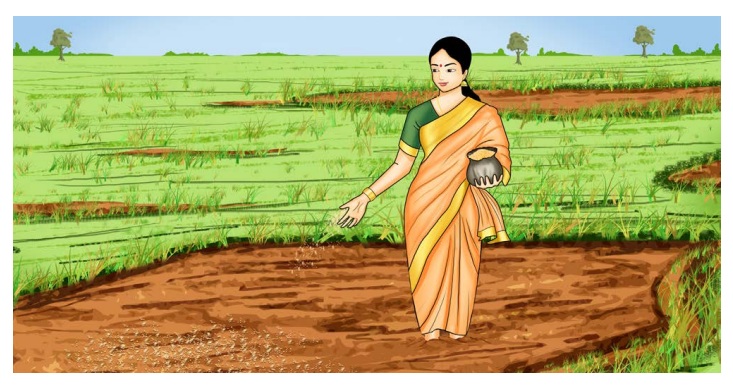
Glossary
Distribute : give a share
responsibility : power
millet : a cereal grown in warm countries
sacred : holy
harvest : yield
wisely : cleverly
LET US UNDERSTAND
A. Match with the picture.
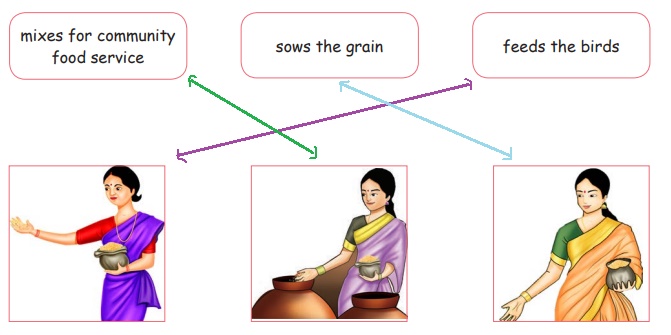
B. Fill in the blanks.
(feed, three, millet)
1. The farmer had three daughters.
2. He offered millet to his daughters.
3. The second daughter feed to a flock of birds.
C. Answer for the following questions.
1. What did the father give to all the daughters?
The farmer gave each daughter a bag of millet.
2. What did the first daughter do?
The first daughter fed the grains to a flock of birds.
3. How did the second daughter use the grain?
The second daughter mixed the grains with the other grains and gave them for community food service.
4. How did the third daughter use the grain?
The third daughter sowed the grains and got a good harvest.
5. Who is the wisest of all?
The third daughter is the wisest of all.
D. Try your own.
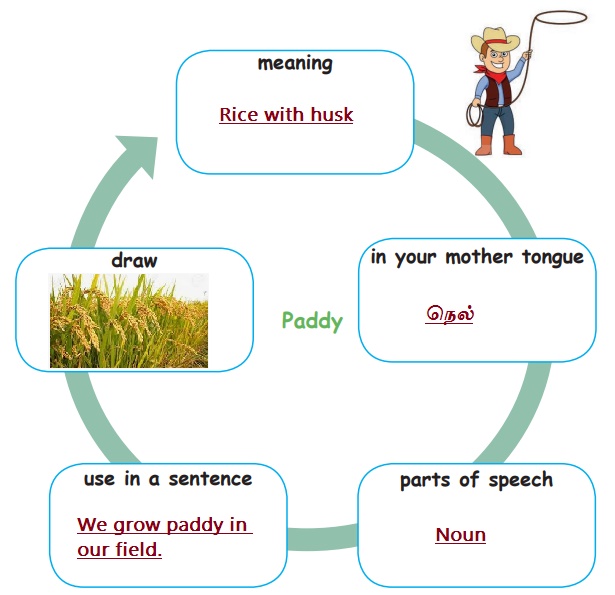
E. Speak and win.
Pick and support any one of the three daughters. Say some sentences for the one you support and say some sentences against the other two to win.

I support the first daughter because ……. it is good to feed birds and animals
I support the second daughter because ……. it is good to feed poor people in community food service
I support the third daughter because ……. it is good to multiply what we have.
LET US READ ALOUD
Read the passage three times and colour a bull for each time.
Mr. Murugan is a farmer. He has a small piece of land and two bulls. He takes good care of his bulls as they help him in farming. Every morning, he takes the bulls for grazing. When it rains he ploughs the land with the bulls. As he has no one to help he starts sowing the seed before sunrise. He irrigates the crop till it grows. He reaps and binds the crop then takes it to thrash the paddy. Finally, with the help of the bulls he takes the paddy to his house.

A. Circle/Underline the main idea of the passage.
1. Murugan was a miser.
2. Murugan loved his bulls and farming.
3. Murugan wished to have people to work.
B. Name the actions of Murugan.

reaps, ploughs, threshes
LET US WRITE
My Autobiography
Make the children write their own story, following questions will help them to write. Ask them to gather from their parents before writing and ask them to give a title.
1. When were you born?
I was born in 2008.
2. Where were you born?
I was born in Tenkasi.
3. What is your father’s name and what is he?
My father’s name is RaviVarman. He is an accountant.
4. What is your mother’s name and what is she?
My mother’s name is Devi. She is a teacher.
5. What is your birth order?
I am the first child of my parents.
6. Do you have any nickname, if yes, reason for that?
My nick name is Cricket Raja because I play cricket well.
7. An interesting incident that happened in your life.
In a friendly match I hit a century. No one could stump me out.
Note to the teacher: Give the same kind of information of a famous person and make them write the Biography in simple language for their Portfolio.
I Can Do
A. Look at the picture and answer the following.

Pebbles (கூழாங்கற்கள்) : There are many pebbles in this river.
B. Circle the correct plural form.
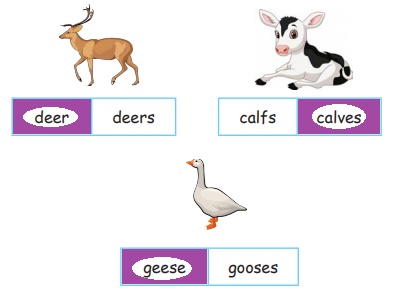
C. Write the plural form.
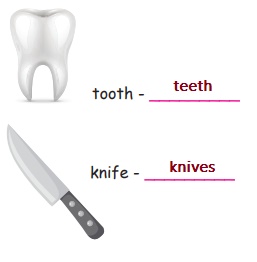
D. Recite the poem ‘Farmer’s friend’ with correct intonation.
E. Match the rhyming words.
health – charm
hook – wealth
harm – look
Answer
health – wealth
hook – look
harm – charm
F. Write the correct forms for the past continuous tense.
1. She was writing the homework at 6 ‘o’ clock. (write)
2. They were playing when I arrived there. (play)
3. I was dancing while he was singing. (dance)
Learning Outcome
Now I can…
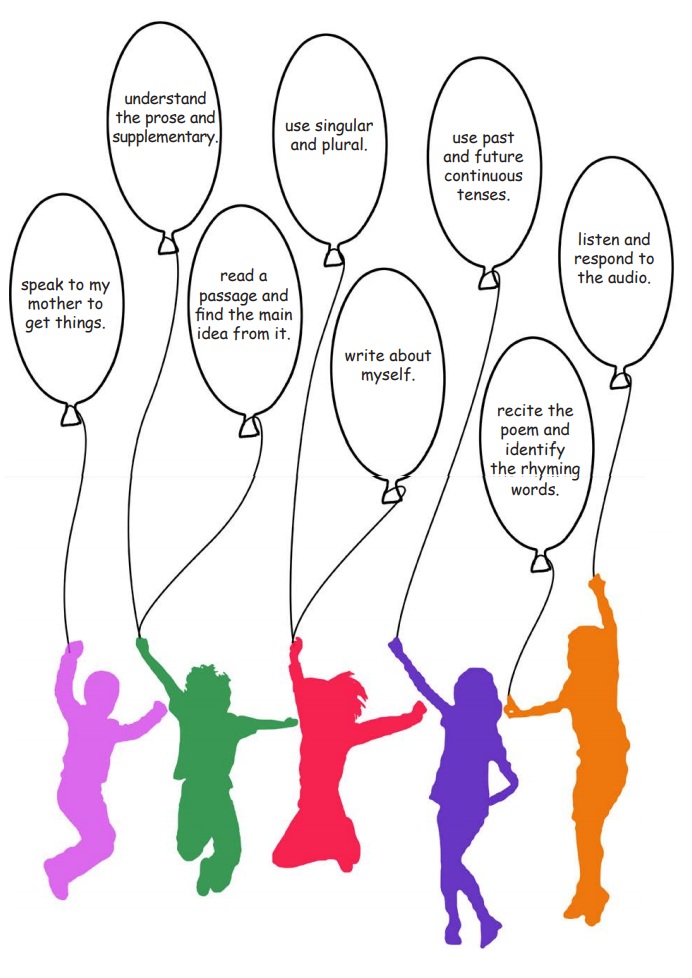
Note to the teacher: Ask children to colour the balloon when they achieve the learning outcome.














